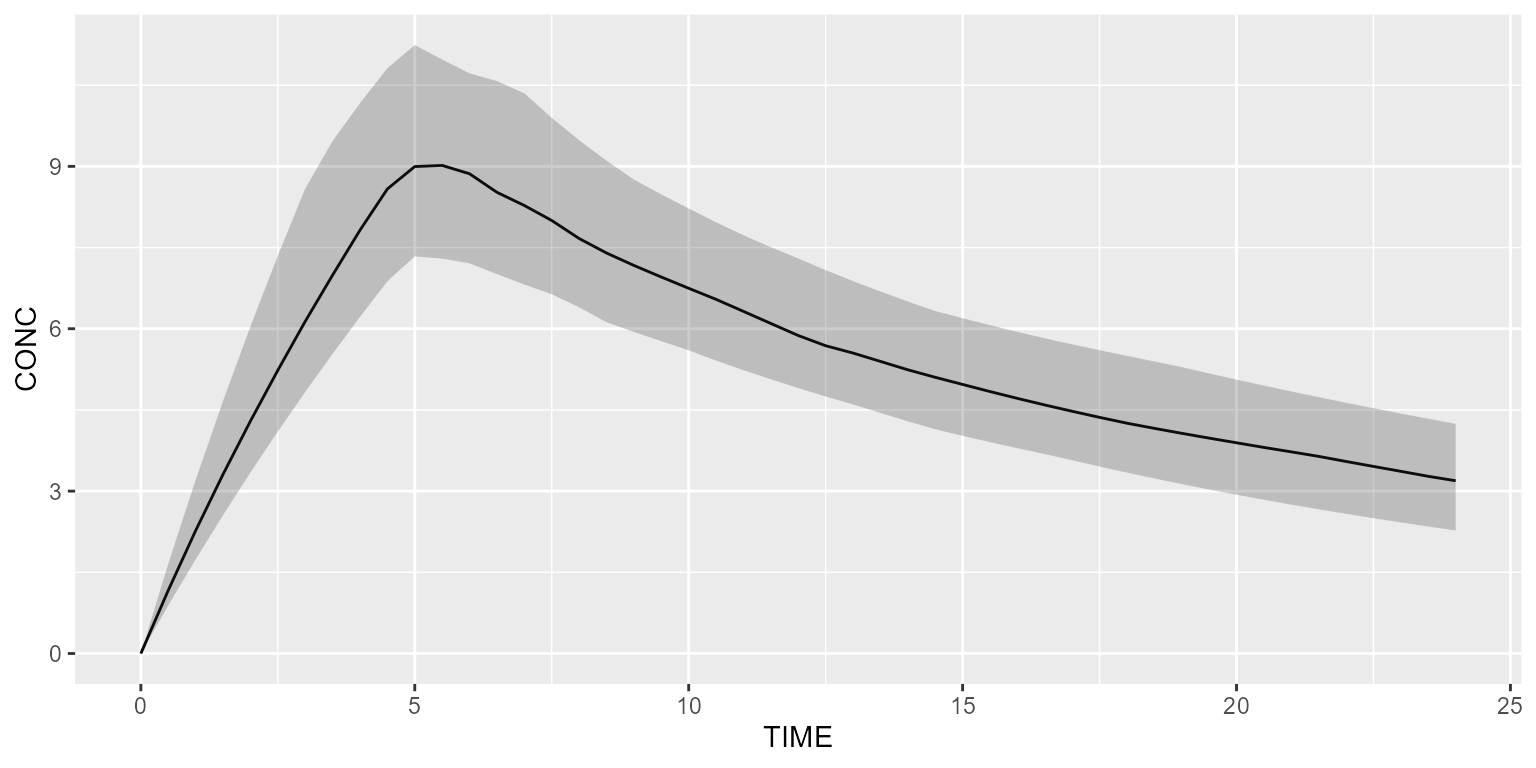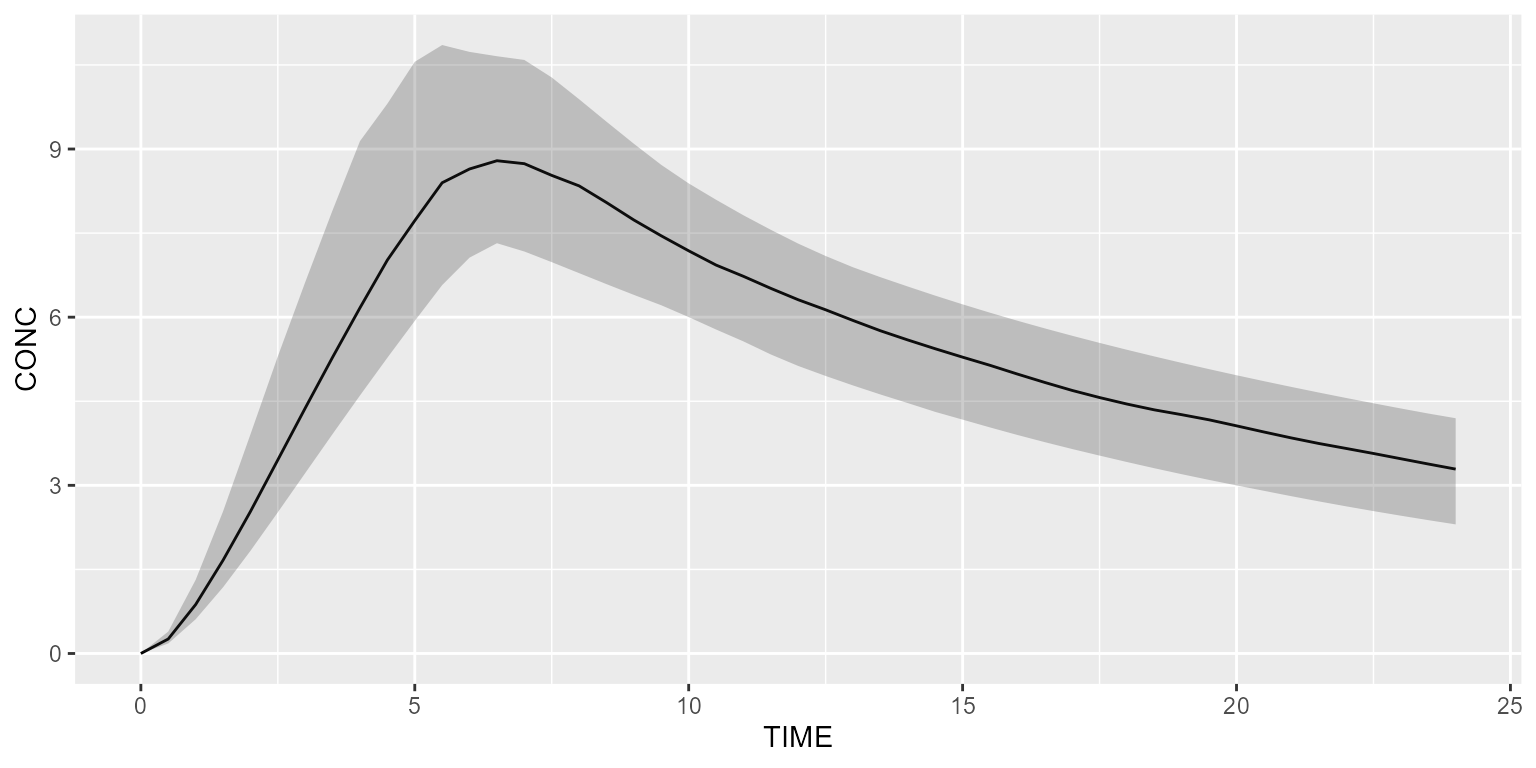There are 2 ways to implement infusions in CAMPSIS:
- in the model: infusion duration or rate is defined for each compartment
- in the dataset: infusion duration or rate is defined for infusion
In the first case, the simulation engine will take care of the infusion duration or rate (RATE in dataset will be -1 or -2). In the second case, CAMPSIS will inject specific values in the RATE column of the dataset.
Infusion duration or rate implemented in model
Let’s use a 2-compartment model without absorption compartment to illustrate how this can be achieved.
model <- model_suite$nonmem$advan3_trans4For this example, we’re going to define a lag time D1
for this absorption compartment.
First let’s create a new parameter D1, log-normally
distributed with a median of 5 hours and 20% CV.
model <- model %>% add(Theta(name="D1", value=5))
model <- model %>% add(Omega(name="D1", value=20, type="cv%"))Now, let’s add an equation to the drug model to define
D1.
Finally, we need to tell CAMPSIS that D1 corresponds the
infusion duration for the first compartment.
model <- model %>% add(InfusionDuration(compartment=1, rhs="D1"))Our persisted drug model would look like this:
model## [MAIN]
## CL=THETA_CL*exp(ETA_CL)
## V1=THETA_V1*exp(ETA_V1)
## V2=THETA_V2*exp(ETA_V2)
## Q=THETA_Q*exp(ETA_Q)
## S1=V1
## D1=THETA_D1*exp(ETA_D1)
##
## [ODE]
## d/dt(A_CENTRAL)=Q*A_PERIPHERAL/V2 + (-CL/V1 - Q/V1)*A_CENTRAL
## d/dt(A_PERIPHERAL)=-Q*A_PERIPHERAL/V2 + Q*A_CENTRAL/V1
## d/dt(A_OUTPUT)=CL*A_CENTRAL/V1
## F=A_CENTRAL/S1
##
## [DURATION]
## A_CENTRAL=D1
##
## [ERROR]
## CONC=F
## CONC_ERR=CONC*(EPS_PROP + 1)
##
##
## THETA's:
## name index value fix
## 1 CL 1 5 FALSE
## 2 V1 2 80 FALSE
## 3 V2 3 20 FALSE
## 4 Q 4 4 FALSE
## 5 D1 5 5 FALSE
## OMEGA's:
## name index index2 value fix type
## 1 CL 1 1 0.025 FALSE var
## 2 V1 2 2 0.025 FALSE var
## 3 V2 3 3 0.025 FALSE var
## 4 Q 4 4 0.025 FALSE var
## 5 D1 5 5 20.000 FALSE cv%
## SIGMA's:
## name index index2 value fix type
## 1 PROP 1 1 0.025 FALSE var
## No variance-covariance matrix
##
## Compartments:
## A_CENTRAL (CMT=1)
## A_PERIPHERAL (CMT=2)
## A_OUTPUT (CMT=3)Now, let’s infuse 1000 mg and run the simulation.
ds1 <- Dataset(50) %>%
add(Infusion(time=0, amount=1000)) %>%
add(Observations(times=seq(0,24,by=0.5)))
results_d1 <- model %>% simulate(dataset=ds1, seed=1)
shadedPlot(results_d1, "CONC")
Infusion duration or rate implemented in dataset
The same simulation can be performed by defining the infusion duration in the dataset.
For this, we need to sample D1 values. This can be done
as follows:
distribution <- ParameterDistribution(model=model, theta="D1", omega="D1") %>%
sample(50L)We can then pass the pre-sampled distribution.
ds2 <- Dataset(50) %>%
add(Infusion(time=0, amount=1000, duration=distribution)) %>%
add(Observations(times=seq(0,24,by=0.5)))Here is an overview of the dataset in its table form if we filter on the doses:
## # A tibble: 6 × 9
## ID ARM TIME EVID MDV AMT CMT RATE DOSENO
## <dbl> <int> <dbl> <int> <int> <dbl> <chr> <dbl> <int>
## 1 1 0 0 1 1 1000 1 226. 1
## 2 2 0 0 1 1 1000 1 193. 1
## 3 3 0 0 1 1 1000 1 236. 1
## 4 4 0 0 1 1 1000 1 146. 1
## 5 5 0 0 1 1 1000 1 187. 1
## 6 6 0 0 1 1 1000 1 235. 1Let’s now simulate this dataset using the original model.
results_d1 <- model_suite$nonmem$advan4_trans4 %>% simulate(dataset=ds2, seed=1)
shadedPlot(results_d1, "CONC")
